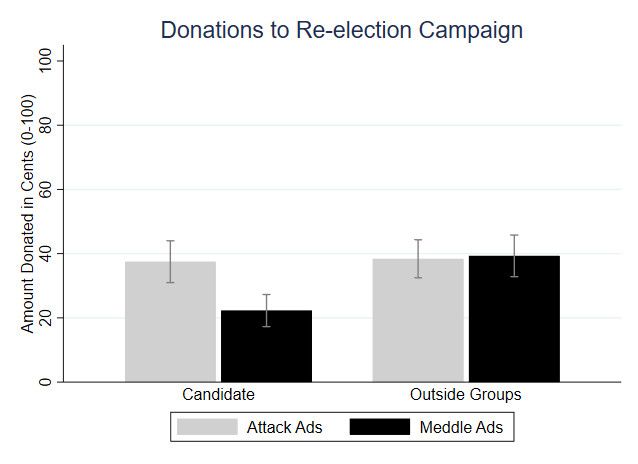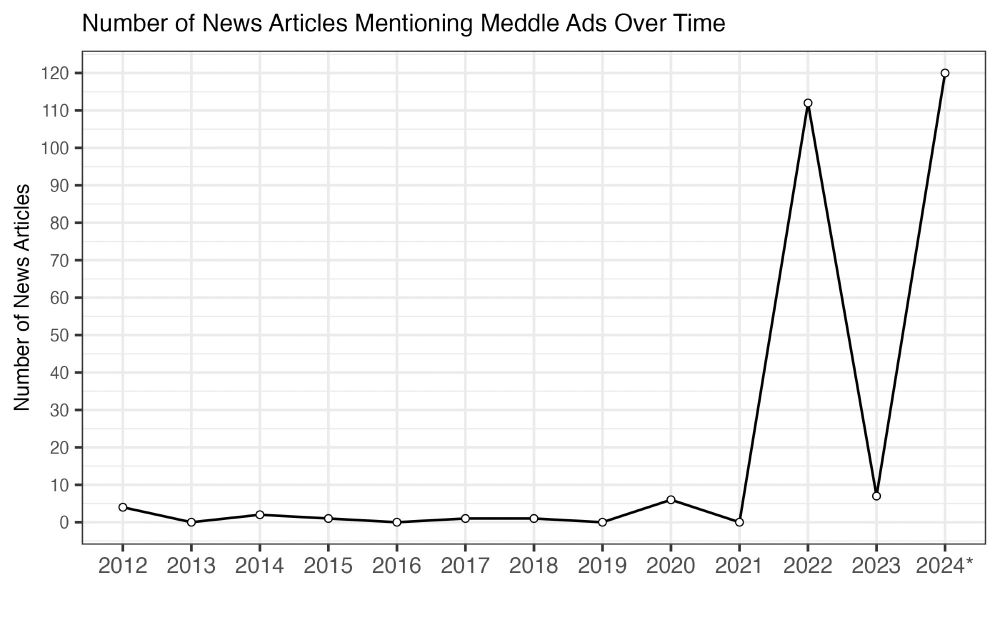
This is joint work with Zak Tormala and Christian Wheeler at Stanford.

This is joint work with Zak Tormala and Christian Wheeler at Stanford.

‣ Candidates are not penalized when meddling is done by parties or outside organizations
‣ Candidates are not penalize if they reframe meddling as necessary to protect democracy

‣ Candidates are not penalized when meddling is done by parties or outside organizations
‣ Candidates are not penalize if they reframe meddling as necessary to protect democracy
‣ measures of aversion (choice, donations, attitudes, word-of-mouth)
‣ control conditions (no information, issue ads, attack ads, microtargeting)
‣ paradigms (conjoint, vignette studies, NLP analysis of online comments)

‣ measures of aversion (choice, donations, attitudes, word-of-mouth)
‣ control conditions (no information, issue ads, attack ads, microtargeting)
‣ paradigms (conjoint, vignette studies, NLP analysis of online comments)
Consumers might tolerate meddle ads because of polarization and wanting to keep the out-party out of power.
Consumers might be averse to meddle ads. It is underhanded and risky.

Consumers might tolerate meddle ads because of polarization and wanting to keep the out-party out of power.
Consumers might be averse to meddle ads. It is underhanded and risky.
Feel free to nominate anyone whom I might have missed.
go.bsky.app/8mGBELg

Feel free to nominate anyone whom I might have missed.
go.bsky.app/8mGBELg
‣ Candidates are not penalized when meddling is done by parties or outside organizations
‣ Candidates are not penalize if they reframe meddling as necessary to protect democracy

‣ Candidates are not penalized when meddling is done by parties or outside organizations
‣ Candidates are not penalize if they reframe meddling as necessary to protect democracy
‣ measures of aversion (choice, donations, attitudes, word-of-mouth)
‣ control conditions (no information, issue ads, attack ads, microtargeting)
‣ paradigms (conjoint, vignette studies, NLP analysis of online comments)

‣ measures of aversion (choice, donations, attitudes, word-of-mouth)
‣ control conditions (no information, issue ads, attack ads, microtargeting)
‣ paradigms (conjoint, vignette studies, NLP analysis of online comments)
Their goal? To boost their own chances in the general election by helping candidates who might are easier to defeat.
How do consumers react to this novel advertising strategy, which we call #meddle ads?

Their goal? To boost their own chances in the general election by helping candidates who might are easier to defeat.
How do consumers react to this novel advertising strategy, which we call #meddle ads?
‣ in-party members
‣ someone whose partisan identity is unknown
‣ non-prototypical out-party sources
‣ out-party sources who humanize and individuate themselves

‣ in-party members
‣ someone whose partisan identity is unknown
‣ non-prototypical out-party sources
‣ out-party sources who humanize and individuate themselves



When people are receptive to opposing views coming from members of the opposing party, receptiveness backfires.

When people are receptive to opposing views coming from members of the opposing party, receptiveness backfires.

